Unit 2 The universal language Extended reading 课件(共26张,内嵌视频)-2025-2026学年 译林版(2020)选择性必修第一册
文档属性
| 名称 | Unit 2 The universal language Extended reading 课件(共26张,内嵌视频)-2025-2026学年 译林版(2020)选择性必修第一册 |
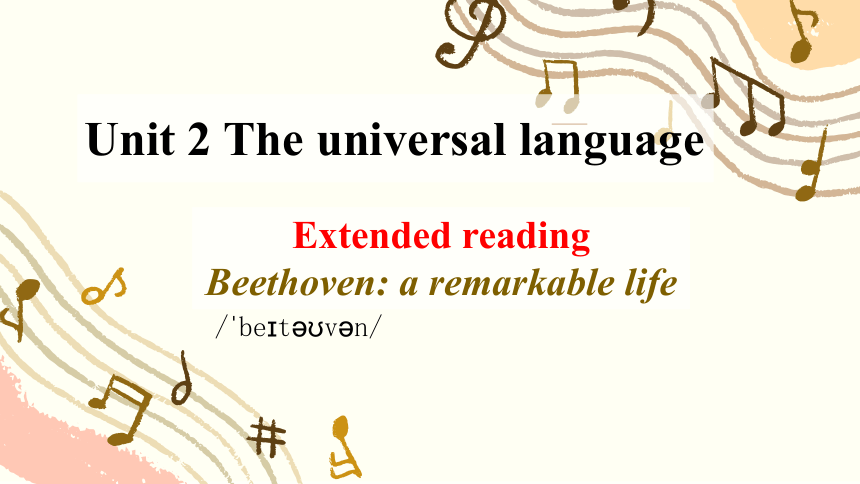
|
|
| 格式 | pptx | ||
| 文件大小 | 13.5MB | ||
| 资源类型 | 教案 | ||
| 版本资源 | 牛津译林版(2019) | ||
| 科目 | 英语 | ||
| 更新时间 | 2025-06-17 00:00:00 | ||
图片预览

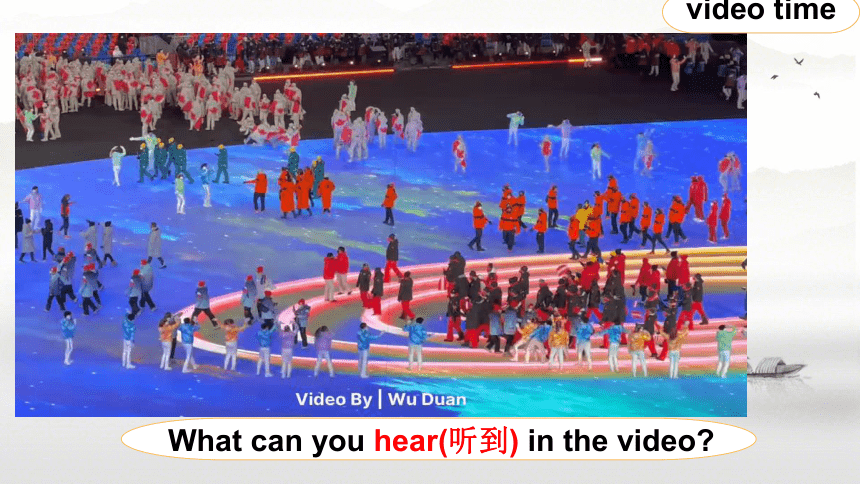
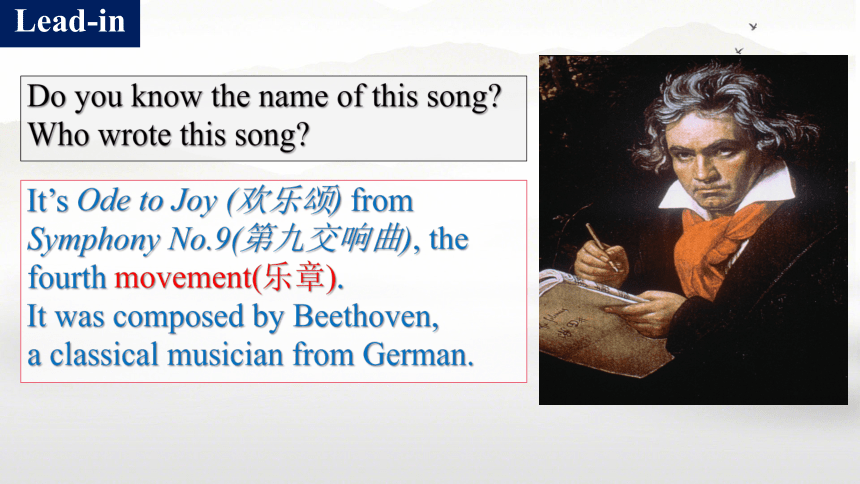
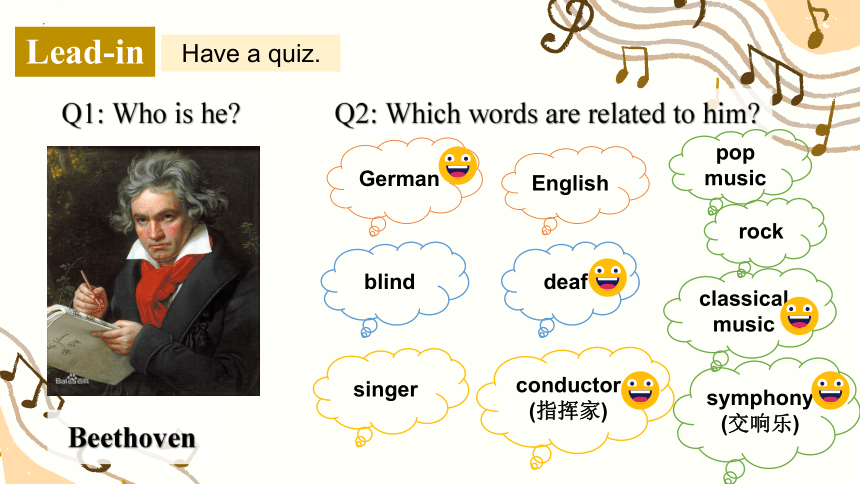
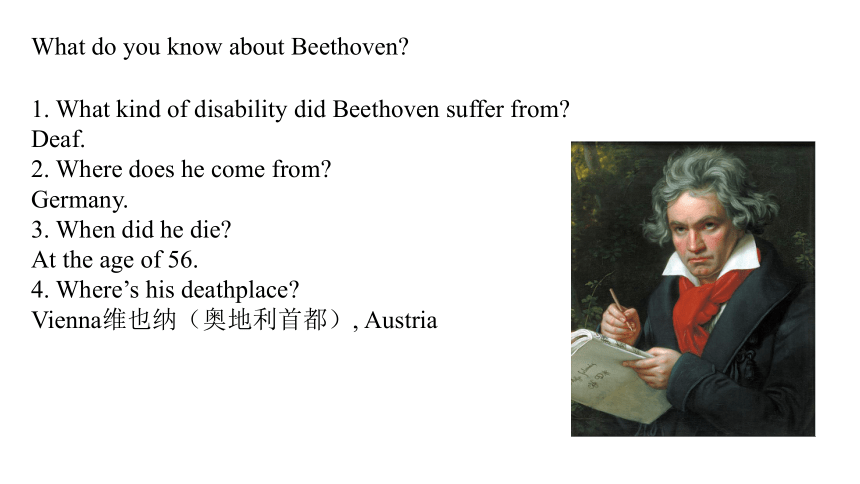
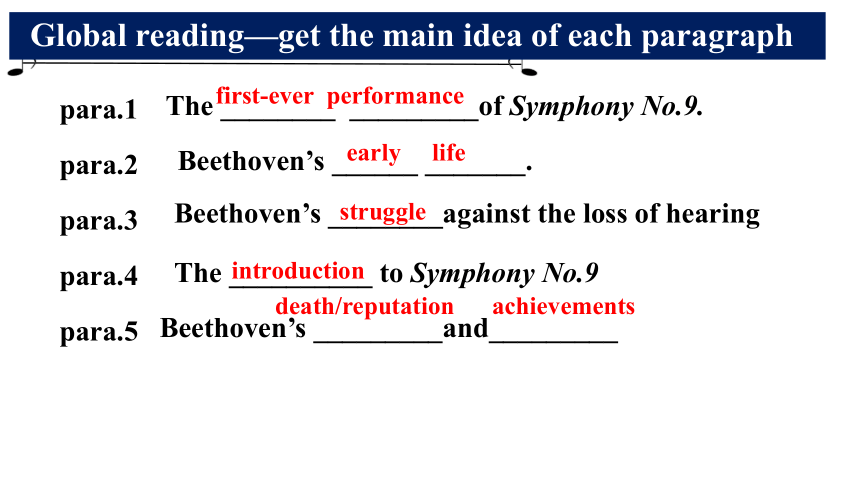

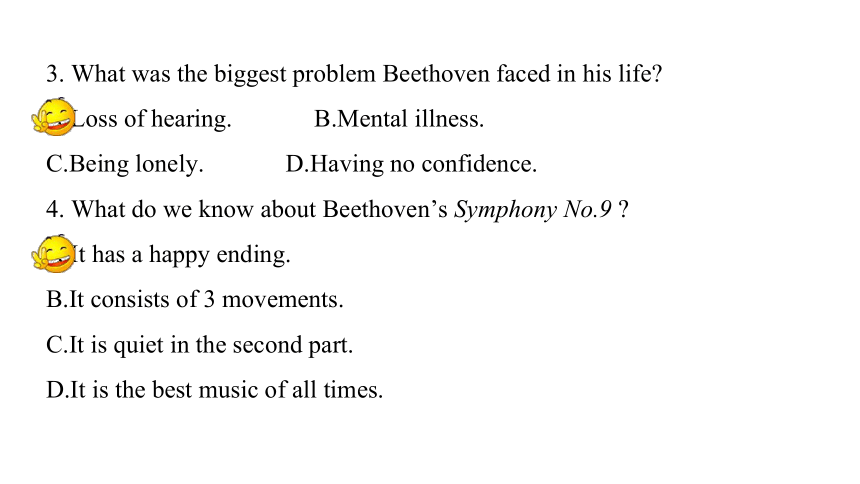
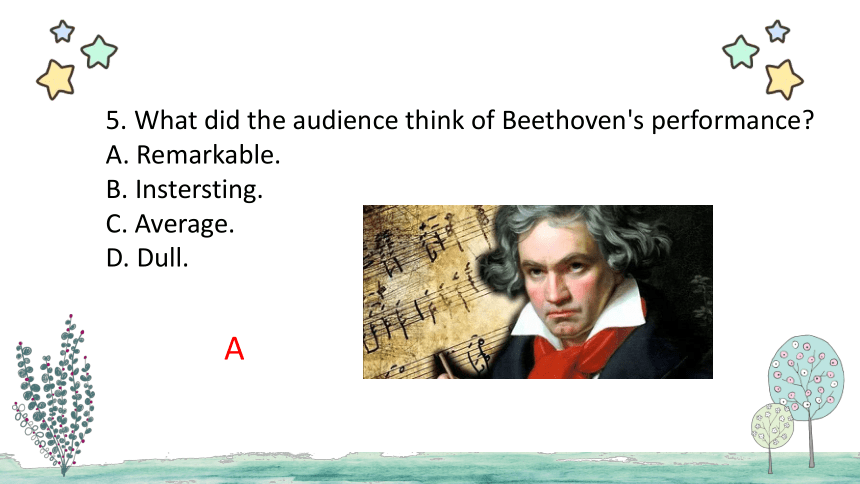
文档简介
(共26张PPT)
Unit 2 The universal language
Extended reading
Beethoven: a remarkable life
/ be t v n/
video time
What can you hear(听到) in the video
Lead-in
Do you know the name of this song
Who wrote this song
It’s Ode to Joy (欢乐颂) from Symphony No.9(第九交响曲), the fourth movement(乐章).
It was composed by Beethoven,
a classical musician from German.
Lead-in
Have a quiz.
Beethoven
Q1: Who is he
Q2: Which words are related to him
German
blind
English
deaf
singer
conductor
(指挥家)
symphony
(交响乐)
classicalmusic
pop music
rock
What do you know about Beethoven
1. What kind of disability did Beethoven suffer from
Deaf.
2. Where does he come from
Germany.
3. When did he die
At the age of 56.
4. Where’s his deathplace
Vienna维也纳(奥地利首都), Austria
para.1
para.2
para.3
para.4
para.5
The ________ _________of Symphony No.9.
Beethoven’s ______ _______.
Beethoven’s ________against the loss of hearing
The __________ to Symphony No.9
Beethoven’s _________and_________
first-ever performance
early life
struggle
introduction
death/reputation achievements
Global reading—get the main idea of each paragraph
Task 2 Choose the best answer.
1. Why was Beethoven still lost in the music when the performance finished
A. He saw a sea of people standing and cheering.
B. He heard something truly special.
C.He faced the crowd all the time.
D. He couldn’t be aware of the audience’s response.
2.Why is Mozart mentioned in Paragraph 2
A.To introduce the famous muscian.
B.To highlight Beethoven’s early talent.
C.To show Beethoven’s great achievements.
D.To emphasize Beethoven’s good connections.
3. What was the biggest problem Beethoven faced in his life
A.Loss of hearing. B.Mental illness.
C.Being lonely. D.Having no confidence.
4. What do we know about Beethoven’s Symphony No.9
A.It has a happy ending.
B.It consists of 3 movements.
C.It is quiet in the second part.
D.It is the best music of all times.
5. What did the audience think of Beethoven's performance
A. Remarkable.
B. Instersting.
C. Average.
D. Dull.
A
6. Which of the following is NOT true
A. Beethoven's brilliant life was predicted by many music masters.
B. The loss of his hearing didn't make a difference to Beethoven.
C. Symphony No.9 was Beethoven's last major work.
D. Beethoven managed to overcome problems in his life.
B
7. What is the author's purpose of writing the passage
A. To tell readers how to treat hearing loss.
B. To encourage more listeners to listen to the music.
C. To recommend Symphony No.9 to readers.
D. To introduce Beethoven's remarkable life.
D
Post- reading
1. How does the author introduce the topic
By using flashback.
He picked up several moments in Beethoven’s life to introduce the topic.
2. Can you find the transitional sentence that used a flashback
Symphony No.9 was Beethoven’s last major piece of music in a vast body of works written throughout his remarkable life.
What do you think makes a great musician
Talent
Creativity
Determination
Passion
Find out Beethoven’s qualities as a musician by adding adjectives to the following chart.
Qualities of Beethoven
optimistic
devoted
determined
talented
passionate
intelligent
diligent
persistent
creative
…
Find out Beethoven’s qualities as a musician by adding nouns to the following chart.
Qualities of Beethoven
optimism
determination
devotion
persistence
talent
passion
creativity
intelligence
diligence
…
Task 3 Read Para1 and answer the questions.
(1) What happened on 7 May 1824 in Vienna
(2) What was wrong with Beethoven at that time
(3) How did the audience react to Beethoven’s performance
A crowd of music lovers streamed into a theatre to listen to the first-ever performance of Beethoven’s Symphony No. 9.
He was almost completely deaf and was unaware of the audience’s response.
They all stood, clapped and waved their hats and handkerchiefs to express their appreciation of Beethoven’s masterpiece.
Young gifted possess perfect sense of hearing study music day and night be __________
enjoy a __________
as a wonderful young
musician
His late twenties and later on his life takes ____________ suffer one of the worst possible _______ for a musician darkest moments ___________ difficult to perform in public at first: feel desperate, _________ and ______ keep it a _______ compose the most
famous and treasured
pieces in the history of
________ music—
Symphony No. 9,
and present it on stage
later: never abandon _____ find solutions
a sharp turn
appreciated
reputation
twists
increasingly
depressed
upset
secret
hope
classical
Task 4 Read para 4 and complete the table.
Task 5 Grammatical filling
As a 1.______ (gift) child, Beethoven was pushed by his father to study music. Not long after, he began to be appreciated 2.____ his piano performances.Many important figures like Mozart made 3.___________ (predict) about Beethoven’s future.4._________ , life took a sharp turn.He started to lose his hearing in his late twenties.The loss of hearing made him 5.________ (depress). Despite his hearing loss, he was determined 6.___________(continue) a life full of music.Although he was able to continue composing music, it became 7.____________ (increasing) difficult for him to perform in public.8.______ he presented Symphony No.9 in 1824, the piece has become famous.He died less than three years after the concert in Vienna, aged 56.For his amazing achievements and for his 9.______________ (determine) in his darkest days, Beethoven 10. _________ (regard) as one of the most remarkable musicians who ever lived.
gifted
for
predictions
However
depressed
to continue
increasingly
Since
determination
is regarded
1. Among Beethoven’s qualities, which one is the most important
Talent
Having a talent for music can help a musician develop into a great musician.
Creativity
Imagination and artistic vision allow a great musician to create music that is unique.
Determination
Being a musician is not easy, and when things go wrong, he or she must be able to get through those darkest moments in order to achieve greatness.
Passion
To have a passion for music means that a great musician loves what he or she is doing, so it is not just a job or a career; instead, it is an important part of his or her life.
我要扼住命运的喉咙,它将无法使我完全屈服。
——路德维希·凡·贝多芬
假如你是李华,你的好朋友Jack 因为学习遭受挫折,情绪低落。请你给他写一封信,以贝多芬的事迹为例,给他提些建议,鼓励他面对困难,迎接挑战。
Dear Jack
I’m sorry to hear that you are depressed because of the setbacks in your study. We have just learnt about the story of Beethoven and I really want to share with you.
______________________________________________________________________________________________________________________________________________________________________________________________________________________________________
I sincerely hope my story will help .
Yours
Li Hua
Homework: writing
Sample
As a musician, he suffered from the loss of hearing in his late twenties. At first, he was upset and kept it a secret. But later, he sought for a variety of effective ways to continue composing music. With great determination and persistence during the darkest time, he composed the well-known symphonies, such as Symphony No.5 and No.9.
Homework
1. Finish and polish the composition.
2. Work in groups and find another musician you are
interested in most and make a presentation in the next class.
Beethoven, who lives a remarkable life, is one of my heroes greatly influencing my life. His diligence and persistence of studying music day and night won him a reputation and made him be appreciated by other musicians. Unfortunately, he suffered hearing loss in his late twenties, which once made him depressed and desperate. However, he tried a lot of methods. Eventually, he overcame this desperate situation and finished Symphony No.9, which use extraordinary technique to perform lows and uplifting highs to reflect his suffering, various virtues and genius as a composer.
Example:
Unit 2 The universal language
Extended reading
Beethoven: a remarkable life
/ be t v n/
video time
What can you hear(听到) in the video
Lead-in
Do you know the name of this song
Who wrote this song
It’s Ode to Joy (欢乐颂) from Symphony No.9(第九交响曲), the fourth movement(乐章).
It was composed by Beethoven,
a classical musician from German.
Lead-in
Have a quiz.
Beethoven
Q1: Who is he
Q2: Which words are related to him
German
blind
English
deaf
singer
conductor
(指挥家)
symphony
(交响乐)
classicalmusic
pop music
rock
What do you know about Beethoven
1. What kind of disability did Beethoven suffer from
Deaf.
2. Where does he come from
Germany.
3. When did he die
At the age of 56.
4. Where’s his deathplace
Vienna维也纳(奥地利首都), Austria
para.1
para.2
para.3
para.4
para.5
The ________ _________of Symphony No.9.
Beethoven’s ______ _______.
Beethoven’s ________against the loss of hearing
The __________ to Symphony No.9
Beethoven’s _________and_________
first-ever performance
early life
struggle
introduction
death/reputation achievements
Global reading—get the main idea of each paragraph
Task 2 Choose the best answer.
1. Why was Beethoven still lost in the music when the performance finished
A. He saw a sea of people standing and cheering.
B. He heard something truly special.
C.He faced the crowd all the time.
D. He couldn’t be aware of the audience’s response.
2.Why is Mozart mentioned in Paragraph 2
A.To introduce the famous muscian.
B.To highlight Beethoven’s early talent.
C.To show Beethoven’s great achievements.
D.To emphasize Beethoven’s good connections.
3. What was the biggest problem Beethoven faced in his life
A.Loss of hearing. B.Mental illness.
C.Being lonely. D.Having no confidence.
4. What do we know about Beethoven’s Symphony No.9
A.It has a happy ending.
B.It consists of 3 movements.
C.It is quiet in the second part.
D.It is the best music of all times.
5. What did the audience think of Beethoven's performance
A. Remarkable.
B. Instersting.
C. Average.
D. Dull.
A
6. Which of the following is NOT true
A. Beethoven's brilliant life was predicted by many music masters.
B. The loss of his hearing didn't make a difference to Beethoven.
C. Symphony No.9 was Beethoven's last major work.
D. Beethoven managed to overcome problems in his life.
B
7. What is the author's purpose of writing the passage
A. To tell readers how to treat hearing loss.
B. To encourage more listeners to listen to the music.
C. To recommend Symphony No.9 to readers.
D. To introduce Beethoven's remarkable life.
D
Post- reading
1. How does the author introduce the topic
By using flashback.
He picked up several moments in Beethoven’s life to introduce the topic.
2. Can you find the transitional sentence that used a flashback
Symphony No.9 was Beethoven’s last major piece of music in a vast body of works written throughout his remarkable life.
What do you think makes a great musician
Talent
Creativity
Determination
Passion
Find out Beethoven’s qualities as a musician by adding adjectives to the following chart.
Qualities of Beethoven
optimistic
devoted
determined
talented
passionate
intelligent
diligent
persistent
creative
…
Find out Beethoven’s qualities as a musician by adding nouns to the following chart.
Qualities of Beethoven
optimism
determination
devotion
persistence
talent
passion
creativity
intelligence
diligence
…
Task 3 Read Para1 and answer the questions.
(1) What happened on 7 May 1824 in Vienna
(2) What was wrong with Beethoven at that time
(3) How did the audience react to Beethoven’s performance
A crowd of music lovers streamed into a theatre to listen to the first-ever performance of Beethoven’s Symphony No. 9.
He was almost completely deaf and was unaware of the audience’s response.
They all stood, clapped and waved their hats and handkerchiefs to express their appreciation of Beethoven’s masterpiece.
Young gifted possess perfect sense of hearing study music day and night be __________
enjoy a __________
as a wonderful young
musician
His late twenties and later on his life takes ____________ suffer one of the worst possible _______ for a musician darkest moments ___________ difficult to perform in public at first: feel desperate, _________ and ______ keep it a _______ compose the most
famous and treasured
pieces in the history of
________ music—
Symphony No. 9,
and present it on stage
later: never abandon _____ find solutions
a sharp turn
appreciated
reputation
twists
increasingly
depressed
upset
secret
hope
classical
Task 4 Read para 4 and complete the table.
Task 5 Grammatical filling
As a 1.______ (gift) child, Beethoven was pushed by his father to study music. Not long after, he began to be appreciated 2.____ his piano performances.Many important figures like Mozart made 3.___________ (predict) about Beethoven’s future.4._________ , life took a sharp turn.He started to lose his hearing in his late twenties.The loss of hearing made him 5.________ (depress). Despite his hearing loss, he was determined 6.___________(continue) a life full of music.Although he was able to continue composing music, it became 7.____________ (increasing) difficult for him to perform in public.8.______ he presented Symphony No.9 in 1824, the piece has become famous.He died less than three years after the concert in Vienna, aged 56.For his amazing achievements and for his 9.______________ (determine) in his darkest days, Beethoven 10. _________ (regard) as one of the most remarkable musicians who ever lived.
gifted
for
predictions
However
depressed
to continue
increasingly
Since
determination
is regarded
1. Among Beethoven’s qualities, which one is the most important
Talent
Having a talent for music can help a musician develop into a great musician.
Creativity
Imagination and artistic vision allow a great musician to create music that is unique.
Determination
Being a musician is not easy, and when things go wrong, he or she must be able to get through those darkest moments in order to achieve greatness.
Passion
To have a passion for music means that a great musician loves what he or she is doing, so it is not just a job or a career; instead, it is an important part of his or her life.
我要扼住命运的喉咙,它将无法使我完全屈服。
——路德维希·凡·贝多芬
假如你是李华,你的好朋友Jack 因为学习遭受挫折,情绪低落。请你给他写一封信,以贝多芬的事迹为例,给他提些建议,鼓励他面对困难,迎接挑战。
Dear Jack
I’m sorry to hear that you are depressed because of the setbacks in your study. We have just learnt about the story of Beethoven and I really want to share with you.
______________________________________________________________________________________________________________________________________________________________________________________________________________________________________
I sincerely hope my story will help .
Yours
Li Hua
Homework: writing
Sample
As a musician, he suffered from the loss of hearing in his late twenties. At first, he was upset and kept it a secret. But later, he sought for a variety of effective ways to continue composing music. With great determination and persistence during the darkest time, he composed the well-known symphonies, such as Symphony No.5 and No.9.
Homework
1. Finish and polish the composition.
2. Work in groups and find another musician you are
interested in most and make a presentation in the next class.
Beethoven, who lives a remarkable life, is one of my heroes greatly influencing my life. His diligence and persistence of studying music day and night won him a reputation and made him be appreciated by other musicians. Unfortunately, he suffered hearing loss in his late twenties, which once made him depressed and desperate. However, he tried a lot of methods. Eventually, he overcame this desperate situation and finished Symphony No.9, which use extraordinary technique to perform lows and uplifting highs to reflect his suffering, various virtues and genius as a composer.
Example:
同课章节目录
- Unit 1 Food matters
- Welcome to the unit
- Reading
- Grammar and usage
- Integrated skills
- Extended reading
- Project
- Unit 2 The Universal Language
- Welcome to the unit
- Reading
- Grammar and usage
- Integrated skills
- Extended reading
- Project
- Unit 3 The art of painting
- Welcome to the unit
- Reading
- Grammar and usage
- Integrated skills
- Extended reading
- Project
- Unit 4 Exploring poetry
- Welcome to the unit
- Reading
- Grammar and usage
- Integrated skills
- Extended reading
- Project
